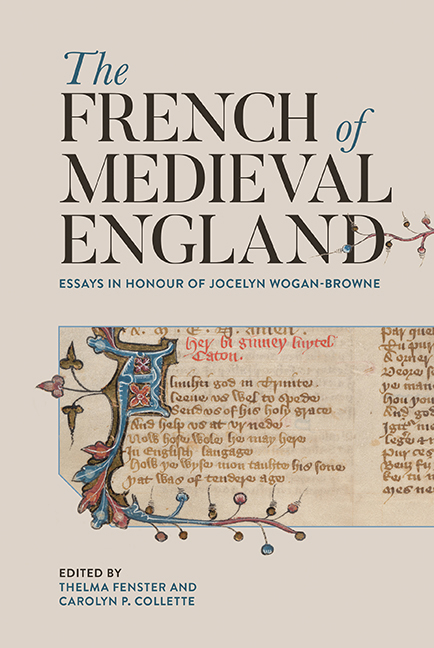Book contents
- Frontmatter
- Contents
- List of Illustrations
- List of Contributors
- List of Abbreviations
- Foreword: ‘The Light I Never Left Behind’: Jocelyn Wogan-Browne
- Introduction: Recognizing the French of Medieval England
- 1 The Gloss to Philippe de Thaon's Comput and the French of England's Beginnings
- 2 The Scandals of Medieval Translation: Thinking Difference in Francophone Texts and Manuscripts
- 3 Contrafacture and Translation: The Prisoner's Lament
- 4 Complaining about the King in French in Thomas Wright's Political Songs of England
- 5 The Chanson d’Aspremont in Bodmer 11 and Plantagenet Propaganda
- 6 The Use of Anglo-Norman in Day-to-Day Communication during the Anglo-Scottish Wars (1295–1314)
- 7 Middle English Borrowing from French: Nouns and Verbs of Interpersonal Cognition in the Early South English Legendary
- 8 William Langland Reads Robert Grosseteste
- 9 Disability Networks in the Campsey Manuscript
- 10 English Women and Their French Books: Teaching about the Jews in Medieval England
- 11 French Residents in England at the Start of the Hundred Years War: Learning English, Speaking English and Becoming English in 1346
- 12 French Immigrants and the French Language in Late-Medieval England
- 13 Fashioning a Useable Linguistic Past: The French of Medieval England and the Invention of a National Vernacular in Early Modern France
- 14 Admiring Ambivalence: on Paul Meyer's Anglo-Norman Scholarship
- 15 Twenty-First Century Gower: The Theology of Marriage in John Gower's Traitié and the Turn toward French
- 16 Royaumes sans frontières: The Place of England in the Long Twelfth Century
- Afterword
- Bibliography
- Index
- Publications of Jocelyn Wogan-Browne
- Tabula Gratulatoria
5 - The Chanson d’Aspremont in Bodmer 11 and Plantagenet Propaganda
Published online by Cambridge University Press: 12 August 2020
- Frontmatter
- Contents
- List of Illustrations
- List of Contributors
- List of Abbreviations
- Foreword: ‘The Light I Never Left Behind’: Jocelyn Wogan-Browne
- Introduction: Recognizing the French of Medieval England
- 1 The Gloss to Philippe de Thaon's Comput and the French of England's Beginnings
- 2 The Scandals of Medieval Translation: Thinking Difference in Francophone Texts and Manuscripts
- 3 Contrafacture and Translation: The Prisoner's Lament
- 4 Complaining about the King in French in Thomas Wright's Political Songs of England
- 5 The Chanson d’Aspremont in Bodmer 11 and Plantagenet Propaganda
- 6 The Use of Anglo-Norman in Day-to-Day Communication during the Anglo-Scottish Wars (1295–1314)
- 7 Middle English Borrowing from French: Nouns and Verbs of Interpersonal Cognition in the Early South English Legendary
- 8 William Langland Reads Robert Grosseteste
- 9 Disability Networks in the Campsey Manuscript
- 10 English Women and Their French Books: Teaching about the Jews in Medieval England
- 11 French Residents in England at the Start of the Hundred Years War: Learning English, Speaking English and Becoming English in 1346
- 12 French Immigrants and the French Language in Late-Medieval England
- 13 Fashioning a Useable Linguistic Past: The French of Medieval England and the Invention of a National Vernacular in Early Modern France
- 14 Admiring Ambivalence: on Paul Meyer's Anglo-Norman Scholarship
- 15 Twenty-First Century Gower: The Theology of Marriage in John Gower's Traitié and the Turn toward French
- 16 Royaumes sans frontières: The Place of England in the Long Twelfth Century
- Afterword
- Bibliography
- Index
- Publications of Jocelyn Wogan-Browne
- Tabula Gratulatoria
Summary
Charlemagne was the great symbol of the political aspirations of the Capetians as they struggled to consolidate their hold over their far-flung and rebellious vassals. When English kings sought legendary precursors to support their territorial ambitions, they turned instead to Arthur. Benedictine monks practiced the lectio divina or, when they descended to earthly literary pursuits, composed elaborate Ovidian homoerotic Latin poetry. All three of these statements would command considerable support among medievalists. Yet the presence of what is arguably a Plantagenet celebration of Charlemagne, a carefully edited copy of La Chanson d’Aspremont, now Cologny, Bodmer 11, in an English Benedictine monastery, St Augustine’s, Canterbury, suggests an alternate literary history. In this history, English monks work hard to prepare and preserve a chanson de geste; Charlemagne serves to strengthen the resolve of thirteenth-century English rulers; and a text that might have once have been considered to belong to French literature is returned to its original Anglo-Norman milieu and assigned a significant role in the English political struggles of the day.
Long before the Conquest, the phenomenally wealthy Benedictine abbey of St Augustine’s, Canterbury had amassed one of the finest libraries in all England. At its height, the abbey housed over 1,900 books, 300 of them still extant. The bulk of the abbey's collection was composed of religious texts, but there were also a certain number of chronicles and prophecies, as well as thirty-four books in French: a copy of Brunetto Latini's encyclopaedia, Li livres dou tresor, popular religious texts such as Laurent d’Orlean's Somme le roi and Grosseteste's Chasteau d’Amour, and several chansons de geste and romances. We are singularly well informed about this collection because St Augustine's had developed a system to encourage elderly brothers to make sure that after their deaths their books, whether ones they had purchased themselves, been given or borrowed from the abbey's huge library, came back into the main collection. The books were duly noted in the library catalogue, Dublin, Trinity College, 360 with, at least in some cases, an entry ‘de acquisitione fratris defuncti’ copied into the book itself. The catalogue, in the careful and monumental edition by B. C. Barker-Benfield, offers a remarkable picture of St Augustine's and its books.
- Type
- Chapter
- Information
- The French of Medieval EnglandEssays in Honour of Jocelyn Wogan-Browne, pp. 100 - 115Publisher: Boydell & BrewerPrint publication year: 2017



